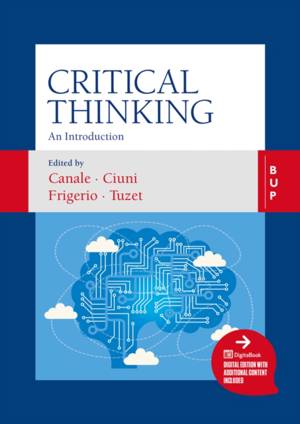
Door een staking bij bpost kan je online bestelling op dit moment iets langer onderweg zijn dan voorzien. Dringend iets nodig? Onze winkels ontvangen jou met open armen!
- Afhalen na 1 uur in een winkel met voorraad
- Gratis thuislevering in België vanaf € 30
- Ruim aanbod met 7 miljoen producten
Door een staking bij bpost kan je online bestelling op dit moment iets langer onderweg zijn dan voorzien. Dringend iets nodig? Onze winkels ontvangen jou met open armen!
- Afhalen na 1 uur in een winkel met voorraad
- Gratis thuislevering in België vanaf € 30
- Ruim aanbod met 7 miljoen producten
Zoeken
Critical Thinking
An Introduction
Damiano Canale, Aldo Frigerio, Giovanni Tuzet, Roberto Ciuni
Paperback | Engels
€ 62,95
+ 125 punten
Omschrijving
Critical Thinking is a discipline that provides the means to distinguish good from bad arguments. In doing so, it draws on the contributions of other disciplines such as logic, psychology, argumentation, and probability theory. By exploiting and developing our ability to reason, it makes us understand why certain reasoning patterns are correct and others are not. The book is an introduction to Critical Thinking, to the role that reasoning plays in concrete contexts and to the forms it assumes in different fields. The first part of the book explains what an argument is and what types of argument exist; the second deals with deductive arguments, with particular attention to arguments involving conditionals and counterfactuals; the third takes into consideration some non-deductive arguments, such as statistical reasoning, reasoning with probabilities, reasoning with explanatory hypotheses, inference to the best explanation, and reasoning by analogy. The volume also clarifies why it is important to think well. Recognizing and providing good arguments helps us have a better understanding of the issues we face when making choices and interacting with others.
Specificaties
Betrokkenen
- Auteur(s):
- Uitgeverij:
Inhoud
- Aantal bladzijden:
- 268
- Taal:
- Engels
Eigenschappen
- Productcode (EAN):
- 9788831322492
- Verschijningsdatum:
- 1/04/2022
- Uitvoering:
- Paperback
- Formaat:
- Trade paperback (VS)
- Afmetingen:
- 170 mm x 239 mm
- Gewicht:
- 521 g

Alleen bij Standaard Boekhandel
+ 125 punten op je klantenkaart van Standaard Boekhandel
Beoordelingen
We publiceren alleen reviews die voldoen aan de voorwaarden voor reviews. Bekijk onze voorwaarden voor reviews.











